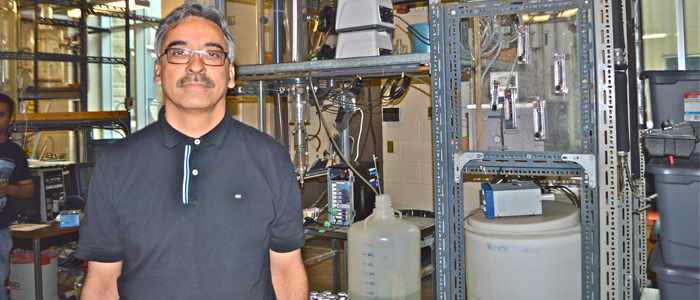Media
Contact
Communications Specialist
Faculty of Engineering
Spencer Engineering Building
Room 2072
Western University
Tel: 519-661-2111 ext. 87015
Email: engineeringcomms@uwo.ca
Chemical and Biochemical Engineering professors convert ideas to commercial ventures

Western Engineering News | May 29, 2015
By Jason Teakle
The Department of Chemical and Biochemical Engineering at Western has been successful in converting several ideas into commercial ventures.
CBE Professors Amarjeet Bassi and Jesse Zhu proposed a transformational idea in a research lab years ago: change traditional packed bed cyclic ion exchange systems to truly continuous systems. Today, the idea has become a reality.
“This is a chasm between the university and the commercial sector,” said Bassi. “Ideas are born here, in the Department of Chemical and Biochemical Engineering. It’s now getting into the market.”
Renix Inc., a London-based purification technology company, led by Christine Haas – a Western Engineering alumna – licensed this technology from Western. Working with Bassi and Zhu, this idea was further refined, reshaped and improved for larger scale, commercial operations. This new concept of uninterrupted ion exchange (UIX) to utilize and regenerate ion exchange resins in a steady state process – without interrupting the separation process – was then established on a commercial scale.
Unlike batch-style ion exchange systems, this new technology allows for uninterrupted resin regeneration. In a UIX system, individual resin beads are loaded and regenerated, but the resin bed itself is never exhausted.
“This technology has a broad range of applications,” explained Bassi. “Some of these industrial sectors include the food industry, wastewater treatment, bio-based chemicals and fuels, and pollution control.”
Bassi explained that the most significant advantages to using UIX technology, as opposed to traditional ion exchange systems, are higher product quality, reduced water and chemical use, lower discharge and a long-term and stable system operation.
Renix has developed the first industrial-scale UIX system complete with automatic controls in the past three years.
“It’s easy to model and develop ideas in the research lab, but in the industrial world it is very different,” explained Bassi. “This is a huge step, to go from sometimes off-the-cuff ideas in a lab to being an industrial reality. Industries need robust, cost-effective solutions and proof of concept at the pilot scale.”
And it shows that Western Engineering works closely with industry on real-world issues.

